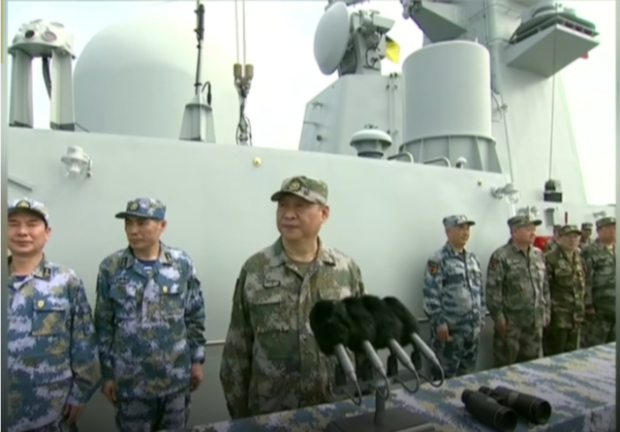China Authorizes Coastguard to Fire on Foreign Ships in Disputed Waters
A new law allows China’s “coastguards to launch pre-emptive strikes without prior warning.”
Just days after Joe Biden’s inauguration as the U.S. president, Communist China has escalated tension in the Asia Pacific, authorizing its coastguards to fire on foreign ships and to destroy structures in disputed waters.
A new law passed by the Communist Party’s top legislative body, the National People’s Congress Standing Committee, allows “the coastguards to launch pre-emptive strikes without prior warning if commanders deem it necessary,” the Hong Kong newspaper South China Morning Post reportedSaturday.
The Chinese legislation does not specify the location of the maritime territories under dispute, but Beijing has built and fortified several artificial islands in the South China Sea, as well as laid claim to island chains belonging to its neighboring countries. The outgoing U.S. Secretary of State Mike Pompeo has called those territorial claims ‘unlawful.’
It is unclear if China informed the members of the Biden administration ahead of launching these hostile naval measures against the U.S. allies in the region. Since November, Beijing is reportedly in ‘backchannel’ talks with individuals close to President Biden. According to Chinese media reports, “several people closely associated with Democratic presidential candidate Joe Biden [in November] contacted China and talked to Chinese think tanks about how to reset the relationship.”
The South China Morning Post, on Saturday, reported the new Chinese coastguard law:
China has risked stoking tensions with its neighbours after it passed a law that for the first time explicitly allows its coastguards to fire on foreign vessels and demolish structures built in disputed waters.
The coastguard law, passed on Friday by China’s top legislative body, the National People’s Congress Standing Committee, came two years after China’s military assumed control of the previously civilian maritime body in 2018.
The law empowers the coastguard to use “all necessary means” to deter threats posed by foreign vessels in waters “under China’s jurisdiction”. It will also allow the coastguards to launch pre-emptive strikes without prior warning if commanders deem it necessary. (…)
Under the new bill, coastguard personnel can demolish structures built or installed by other countries in Chinese-claimed waters and board and inspect foreign ships in the area.
The Trump administration strengthened ties with regional powers to contain China’s militarist expansion. Secretary Pompeo played a key role in creating an Asia-Pacific alliance to counter Beijing’s growing military threat.
Under President Trump’s leadership, the U.S.-led Quadrilateral Security Dialogue initiative, or the quad, which comprises of Australia, Japan, and India, has emerged a strong counterweight to Beijing. This U.S.-backed coalition created a framework for security cooperation, including joint defense exercises and access to each others’ military and naval bases.
Communist China has criticized the creation of this regional security bloc, accusing the Trump administration of building an ‘Indo-Pacific Nato,’ similar to the military alliance which countered the Soviet threat during the Cold War.
With Democrats in the White House, China hopes to undo this legacy of strength forged under the leadership of President Trump. Chinese Foreign Minister Wang Yi recently called for a ‘reset’ in U.S. ties with the incoming administration.
During President Barack Obama’s watch, China launched a massive project to create artificial islands in the South China Sea, encroaching neighboring territories and threatening international waterways. Beijing has since built military bases, naval installations, and aircraft landing strips on these islands.
With its growing economic clout, China purses a policy of territorial and maritime expansion. Beijing has staked territorial claims on 18 of its neighbors.





No comments:
Post a Comment